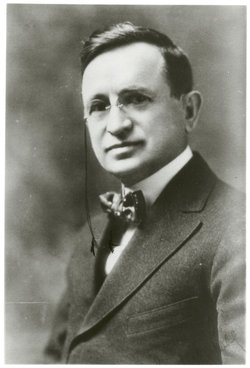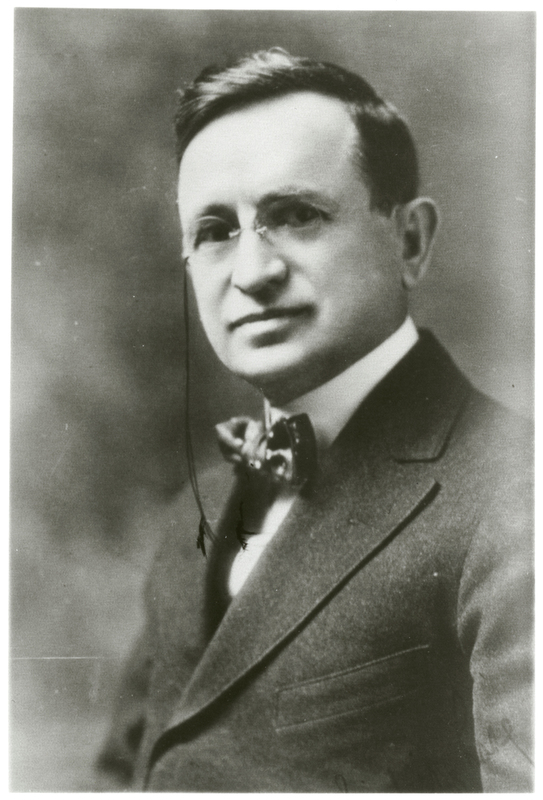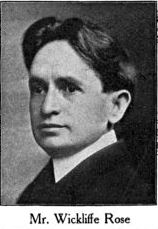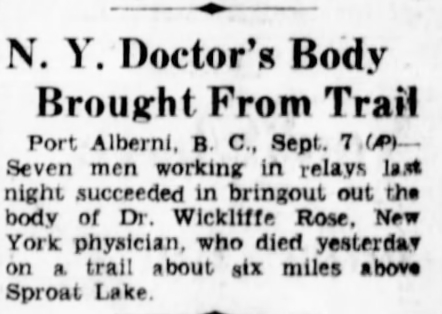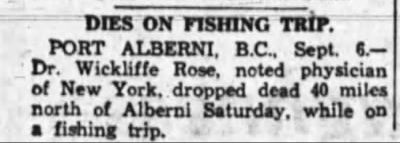General Agent of Peabody Education Fund since 1907; Adm. Secy and member of the Rockefeller Sanitary Commission since 1910. Born Nov. 19, 1862, at Saulsbury, Tenn., son of Kinchen Langston and Jeanette (Cherry) Rose. Educated Univ. of Nashville, A. B. 1889, A. M., 1890; LL.D., Univ. of Miss., 1910; formerly professor of philosophy, Peabody College and Univ. of Nashville; prof. of history and philosophy of education, Univ. of Tenn. Dean of Peabody Coll. and Univ. of Nashville. Married, 1891, Ella M. Sadler, of Ozark, Ark. Member of N.E.A. and many educational organizations. Office: 725 Southern Bldg., Washington, D. C. U.S.A.
Wickliffe Rose was born in the United States in 1862, the son of a wandering preacher and teacher. Rose began his career as a college teacher, then became an educational promoter and planner. After the Civil War, Rose created the first education system in the southern United States, which included primary schools, secondary schools, and the University of North Carolina, and also a system of teacher training. Realising that health had an important bearing on education, Rose also became involved in public health. Beginning in the Southern States, Rose started a public health programme with the backing of the Rockefeller Foundation, to control hookworm, malaria and yellow fever. He then founded public health schools at the John Hopkins University and Harvard, but also wanted a school to benefit the whole world, and so founded the London School of Hygiene and Tropical Medicine, funded by the Rockefeller Foundation, in the 1920's. Becoming interested in the work of the League of Nations, Rose was also instrumental in the establishment of what became the World Health Organisation. Rose's positions included: an original trustee of the Rockefeller Foundation (1913-1928); executive secretary of the Rockefeller Sanitary Commission (1910-1915); director of the International Health Board (1915-1923); president of the General Education Board and the International Education Board (1923-1928). Rose was married, with three children. He died in 1931. The papers include: records of the International Health Board, and on Rose's work against disease; records of the International Education Board; diaries and personal correspondence; a small amount of material on the League of Nations Health Organisation and World Health Organisation; records of Rose's establishment of the Southern United States Education System; material on the founding of schools of Public Health and Hygiene. The papers were assembled by Professor Roy Acheson, during his research on Rose, and given to Churchill Archives Centre in 1997 and 2002. The original arrangement of the papers has been retained. The papers are owned by Churchill College.
The Papers of Wickliffe Rose
Wickliffe Rose was born in Saulsbury, Tennessee, on November 19, 1862. He graduated from the University of Nashville in 1889 and received an A.M. degree from the University in 1890. His career is divided by two major interests and two main associations. The first interest is that of education. Dr. Rose was instructor in history and mathematics at Peabody College from 1891-1892, and then professor of history and philosophy of education at that college from 1892-1902. In 1902 Dr. Rose moved to the faculty of the University of Tennessee where again he was professor of history and philosophy of education. From 1904-1907 he was Dean of Peabody College and the University of Nashville. In 1908 Dr. Rose left academic life, and he joined the Peabody Education Fund as General Agent in 1910. He also served as Executive Secretary for the Southern Education Board during 1909-1910. Dr. Rose's second major interest was public health and, more specifically, public health education. In 1910 he turned down a position as President at Peabody College to become Executive Secretary of the Rockefeller Sanitary Commission until its termination in 1915. With the end of the Commission, Dr. Rose joined the International Health Division of the Rockefeller Foundation and extended the work of the Sanitary Commission to foreign countries, conducted a campaign against yellow fever, and promoted public health at home and abroad. Resigning the Directorship of the International Health Division in 1923, Dr. Rose assumed the Presidency of the General Education Board and the International Education Board where he remained until his retirement in 1928. Wickliffe Rose died on September 5, 1931, while on a fishing trip in British Columbia. --rockefeller.org
General Agent of Peabody Education Fund since 1907; Adm. Secy and member of the Rockefeller Sanitary Commission since 1910. Born Nov. 19, 1862, at Saulsbury, Tenn., son of Kinchen Langston and Jeanette (Cherry) Rose. Educated Univ. of Nashville, A. B. 1889, A. M., 1890; LL.D., Univ. of Miss., 1910; formerly professor of philosophy, Peabody College and Univ. of Nashville; prof. of history and philosophy of education, Univ. of Tenn. Dean of Peabody Coll. and Univ. of Nashville. Married, 1891, Ella M. Sadler, of Ozark, Ark. Member of N.E.A. and many educational organizations. Office: 725 Southern Bldg., Washington, D. C. U.S.A.
Wickliffe Rose was born in the United States in 1862, the son of a wandering preacher and teacher. Rose began his career as a college teacher, then became an educational promoter and planner. After the Civil War, Rose created the first education system in the southern United States, which included primary schools, secondary schools, and the University of North Carolina, and also a system of teacher training. Realising that health had an important bearing on education, Rose also became involved in public health. Beginning in the Southern States, Rose started a public health programme with the backing of the Rockefeller Foundation, to control hookworm, malaria and yellow fever. He then founded public health schools at the John Hopkins University and Harvard, but also wanted a school to benefit the whole world, and so founded the London School of Hygiene and Tropical Medicine, funded by the Rockefeller Foundation, in the 1920's. Becoming interested in the work of the League of Nations, Rose was also instrumental in the establishment of what became the World Health Organisation. Rose's positions included: an original trustee of the Rockefeller Foundation (1913-1928); executive secretary of the Rockefeller Sanitary Commission (1910-1915); director of the International Health Board (1915-1923); president of the General Education Board and the International Education Board (1923-1928). Rose was married, with three children. He died in 1931. The papers include: records of the International Health Board, and on Rose's work against disease; records of the International Education Board; diaries and personal correspondence; a small amount of material on the League of Nations Health Organisation and World Health Organisation; records of Rose's establishment of the Southern United States Education System; material on the founding of schools of Public Health and Hygiene. The papers were assembled by Professor Roy Acheson, during his research on Rose, and given to Churchill Archives Centre in 1997 and 2002. The original arrangement of the papers has been retained. The papers are owned by Churchill College.
The Papers of Wickliffe Rose
Wickliffe Rose was born in Saulsbury, Tennessee, on November 19, 1862. He graduated from the University of Nashville in 1889 and received an A.M. degree from the University in 1890. His career is divided by two major interests and two main associations. The first interest is that of education. Dr. Rose was instructor in history and mathematics at Peabody College from 1891-1892, and then professor of history and philosophy of education at that college from 1892-1902. In 1902 Dr. Rose moved to the faculty of the University of Tennessee where again he was professor of history and philosophy of education. From 1904-1907 he was Dean of Peabody College and the University of Nashville. In 1908 Dr. Rose left academic life, and he joined the Peabody Education Fund as General Agent in 1910. He also served as Executive Secretary for the Southern Education Board during 1909-1910. Dr. Rose's second major interest was public health and, more specifically, public health education. In 1910 he turned down a position as President at Peabody College to become Executive Secretary of the Rockefeller Sanitary Commission until its termination in 1915. With the end of the Commission, Dr. Rose joined the International Health Division of the Rockefeller Foundation and extended the work of the Sanitary Commission to foreign countries, conducted a campaign against yellow fever, and promoted public health at home and abroad. Resigning the Directorship of the International Health Division in 1923, Dr. Rose assumed the Presidency of the General Education Board and the International Education Board where he remained until his retirement in 1928. Wickliffe Rose died on September 5, 1931, while on a fishing trip in British Columbia. --rockefeller.org
Family Members
Sponsored by Ancestry
Advertisement
Advertisement
